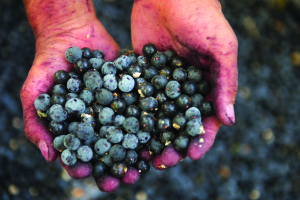Picking your own produce is not only a fun way to spend a summer day, but it also teaches children about where their food comes from and helps consumers get to know Mississippi farms and farmers.
Written by Melanie Addington
Blackberries and Potatoes
Yokna Bottoms Farms
June is harvest time for two crops at Yokna Bottoms Farms: blackberries and potatoes.
“We have done the potato dig twice as part of an annual field day for Community Supported Agriculture (CSA) members and other farm supporters,” Yokna Bottoms Farms owner Doug Davis said. “We mark off an area of our potato patch and let families dig their own potatoes. We ask for half of the potatoes for donation to the food pantry.”
The summer potato dig usually takes place in mid-June, depending on the weather, and more details can be found online.
For blackberries, the farm is open to CSA members for a pick-your-own when the berries are ripe. This usually happens in early June, but again, it depends on the weather, according to Davis. Yokna Bottoms charges $2 per pound for non-CSA members.
Yokna Bottoms Farms is located at 26 CR 471 in Lafayette County. Email yoknabottoms@gmail.com, visit yoknabottoms.com or call 662-380-2367 for more information.
Blueberries
Nesbit Blueberry Plantation
Nesbit Blueberry Plantation is about an hour north of Oxford in Nesbit, Miss. Pat and George Traicoff, their five children and nine grandchildren are all involved with the farm at some time during the year. They grow rabbit-eye blueberries, a Southern variety, and sell them by the gallon.
The farm provides the picking buckets and helps pack the berries in freezer bags for easy transportation home. Prepicked bags are also available for purchase. The cost for pick-your-own is $12 a gallon or $20 a gallon for prepicked.
Nesbit Plantation encourages children to try the blueberries straight off the vine. Visit nesbitblueberry.com to learn more.
Strawberries
Native Son Farm
Native Son Farm in Tupelo, Miss., is the only farm in the state that offers certified naturally grown strawberries. The berries are usually ripe in early or mid-spring, but farm owner Will Reed said this year’s abundant spring rains delayed their crop about six weeks.
Native Son Farm is located at 3811 Mount Vernon Road in Tupelo.
Local CSAs
While not all local farms offer set pick-your-own dates, some small farms or CSAs rely on volunteers to help with the farming.
“If folks just want to get out and work on a farm, nearly all of the local farms would be happy to have volunteers come out and are often willing to exchange a little labor for some produce,” said Daniel Doyle, director of the Mississippi Sustainable Agriculture Network.
Doyle said that volunteers can help the farmers save on harvest, transportation and packaging costs.
“It also saves the farmer time, not sitting at a farmers market for 3 to 5 hours, never mind the picking before and unpacking after, or driving around hustling it to local restaurants,” Doyle said. “It’s also great for the consumer, who can gain a better appreciation for where their food comes from, get outdoors and exercise, eat fresh, ask the farmer questions about production practices and hopefully inspire themselves to grow more food.”
Doyle said it could be a gateway to gardening as people learn to enjoy edible plants and learn more about how to grow them while visiting the farms. To learn more, visit mssagnet.net/resources/find-a-farm.
Foraging
Wild foraging is another way to gather food straight from the source and is a popular hobby with some local residents.
“There are lots of opportunities for wild foraging in the Oxford area,” said Jason Hoeksema, who teaches biology at the University of Mississippi.
Wild blackberries, wild persimmon trees that bear fruit in late fall and wild mushrooms are abundant in local woods and along the Thacker Mountain Trails.
“Chanterelles, black trumpets, and Lactarius indigos usually start emerging near oaks in early June and may continue through the summer and early fall, depending on the rains,” Hoeksema said. “In cooler weather, watch for chicken-of-the-woods, lion’s mane, and oyster mushrooms growing on dead tree trunks. Look for morels in late March and early April in bottomlands and other spots such as privet hedges and landscape mulch.”
He warns not to eat a wild mushroom without confirming its identity with an expert, as some are poisonous. Find details on area foraging field trips on the Friends of Thacker Mountain Trails Facebook page.
On June 20, Hoeksema is providing a mushroom identification workshop at the Strawberry Plains Audubon Center in Holly Springs, Miss. Visit strawberryplains.audubon.org for more information.
Categories: Current Features


CONNECT WITH US!